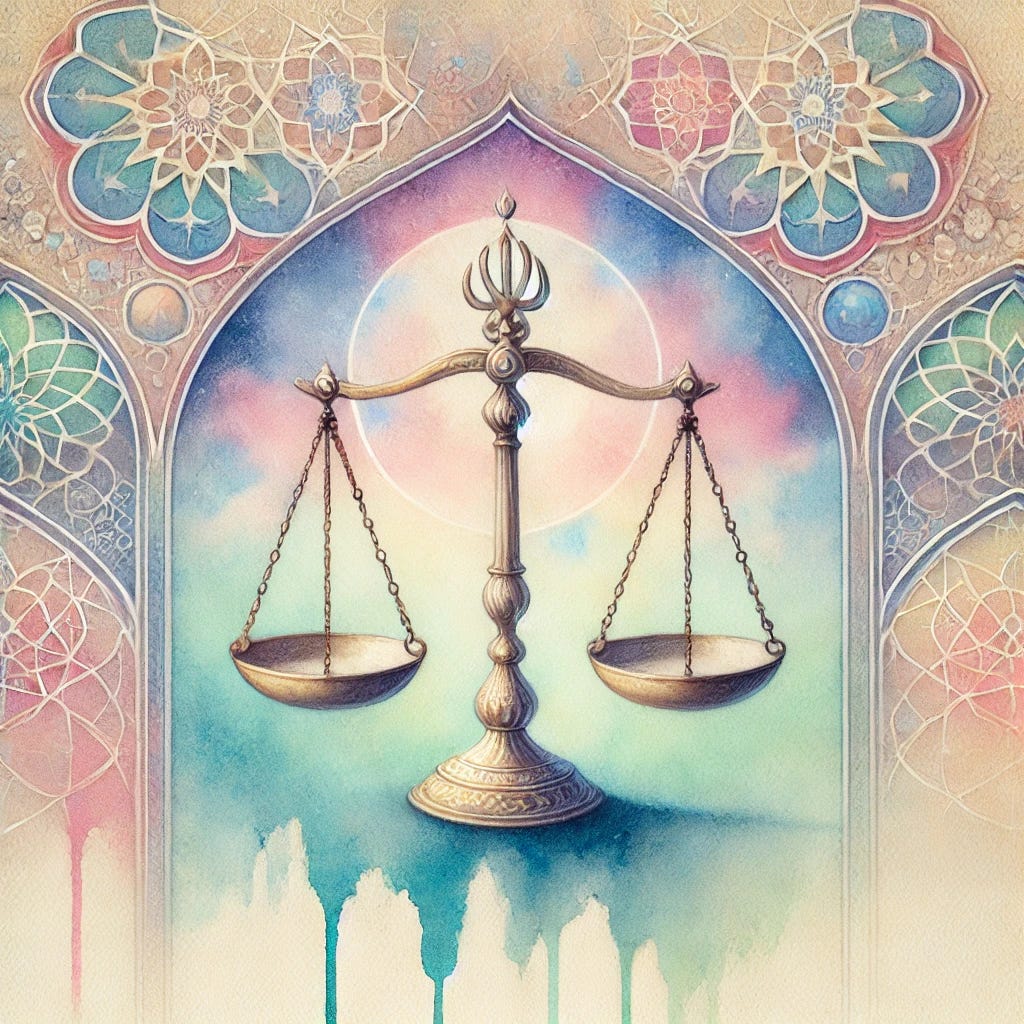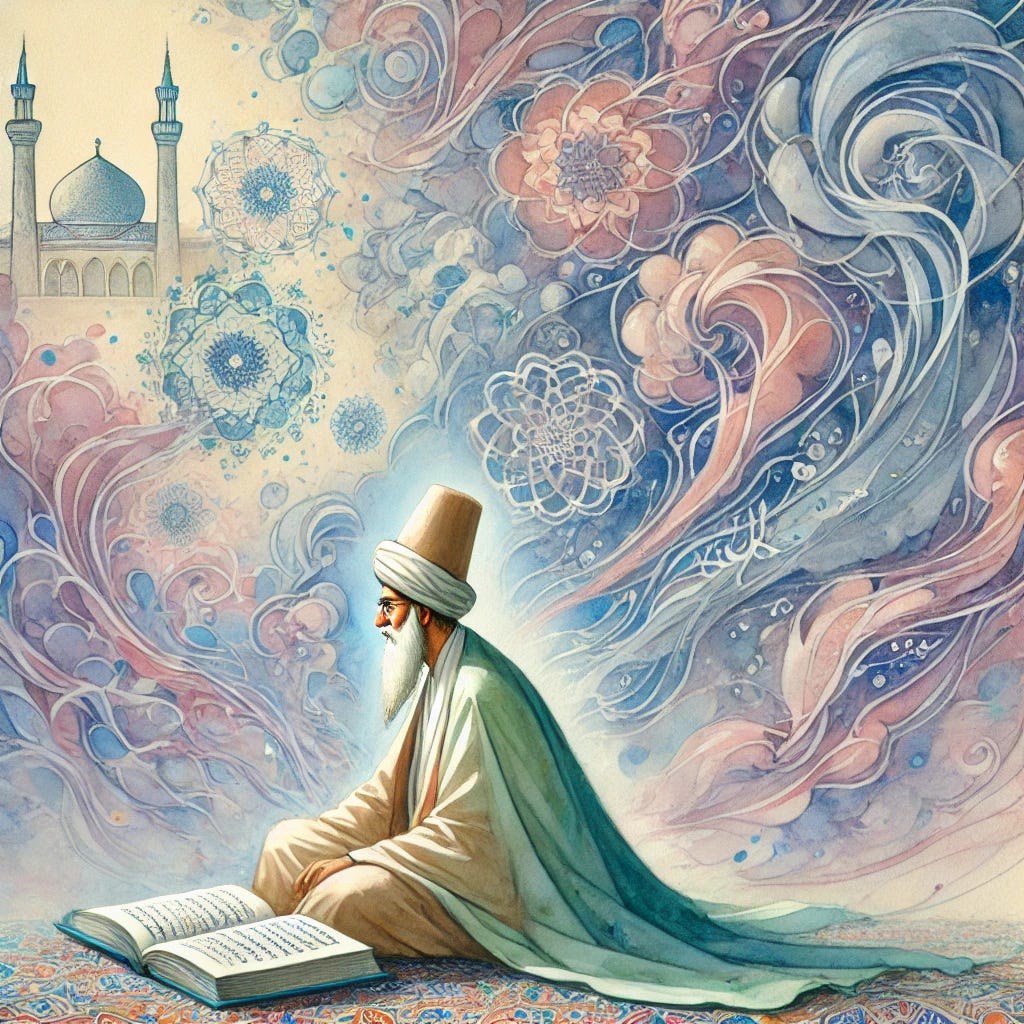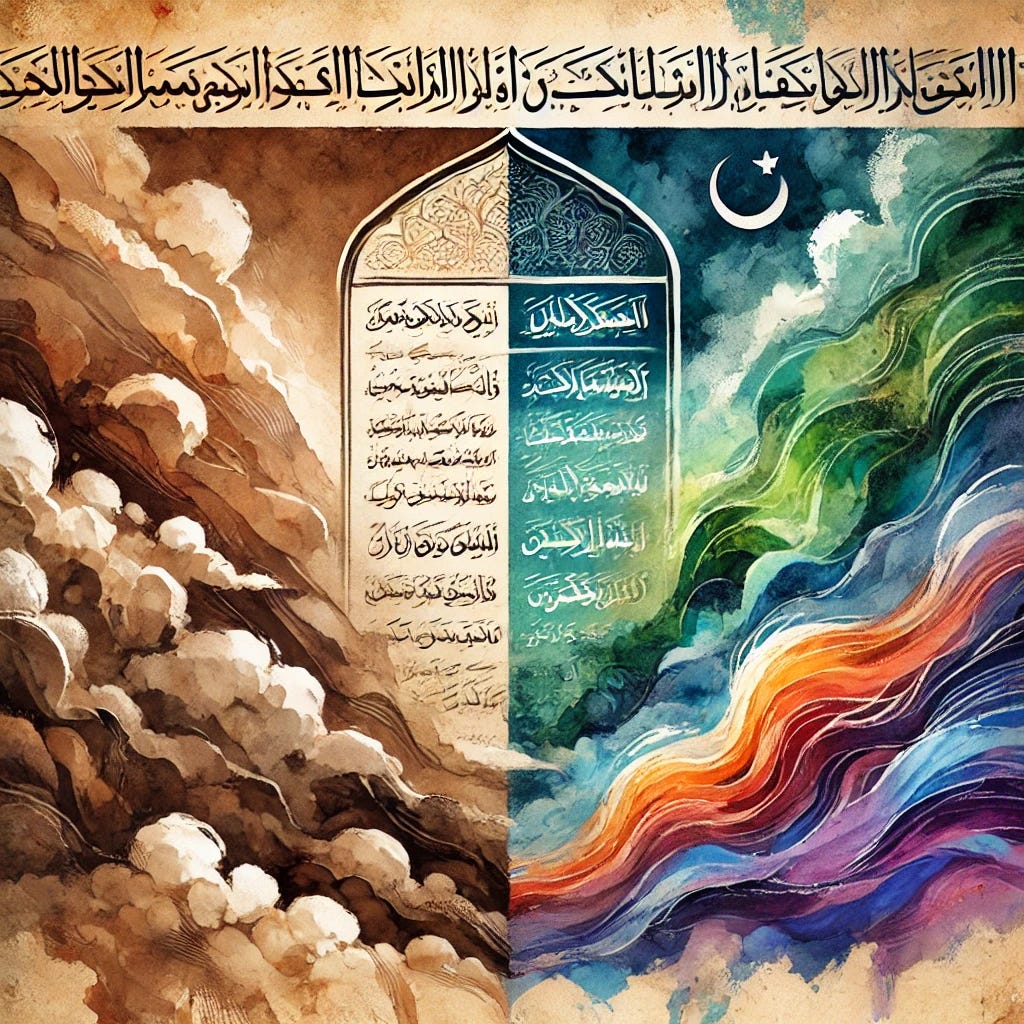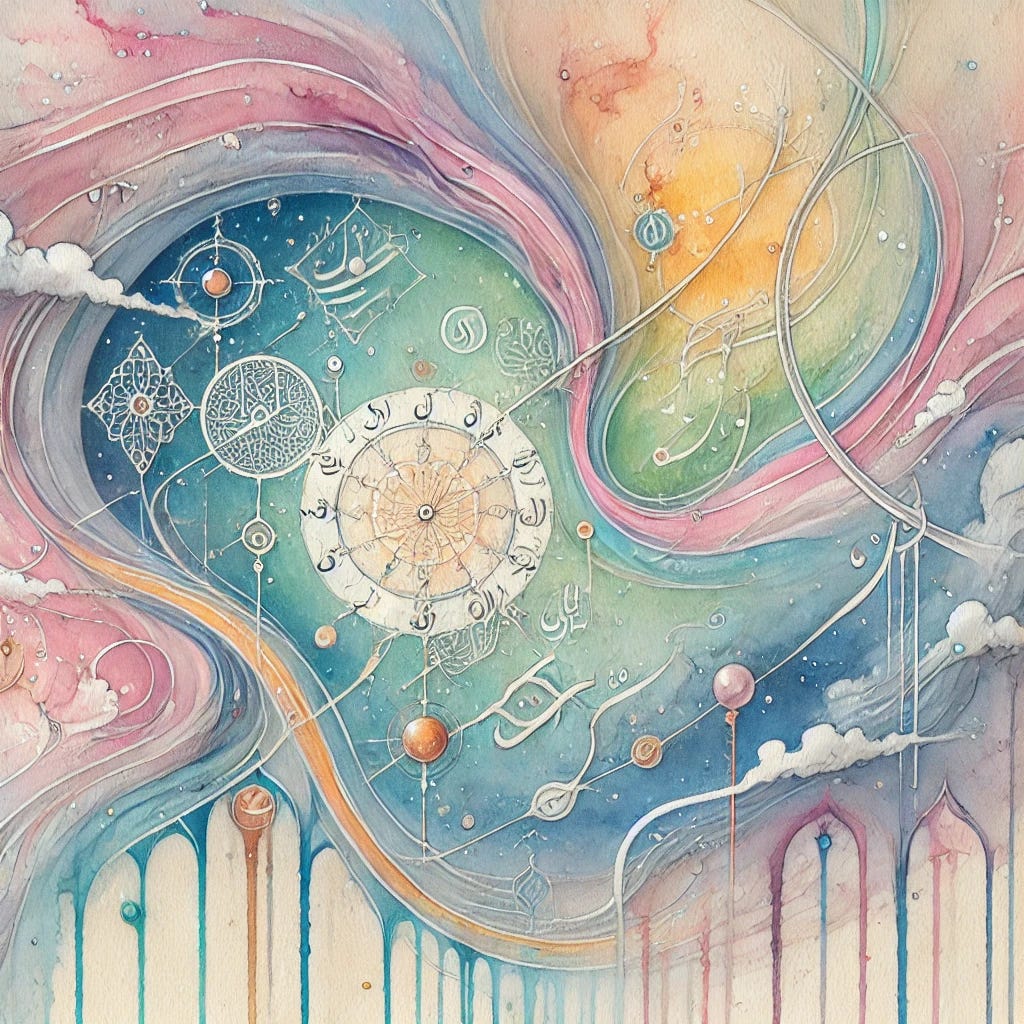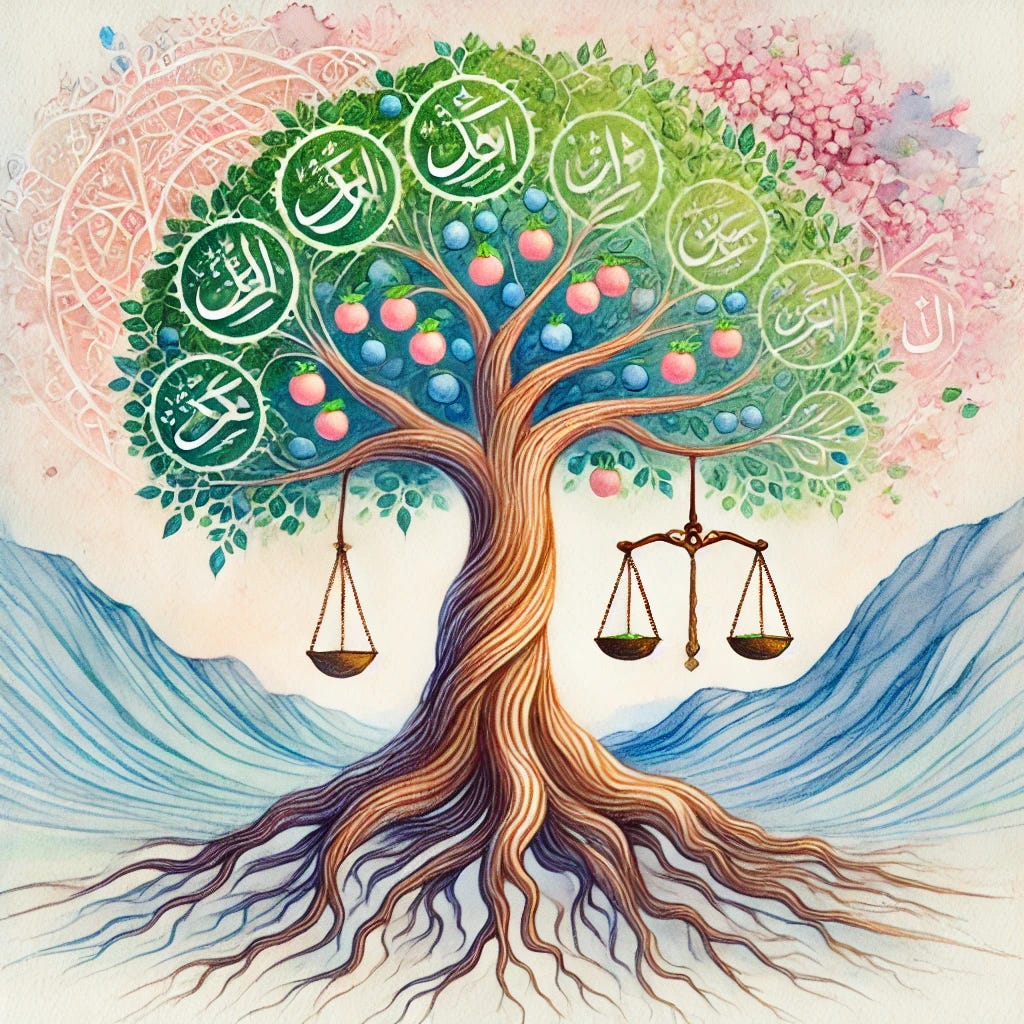[5] The Justice of God
A series of discussions on the teachings of Imam Sadiq (sixth Imam of the Muslims), from the book Misbah ash-Sharia (The Lantern of the Path)
In His Name, the Most High
This is part five of an ongoing series of discussions on the book by Imam as-Sadiq titled ‘Misbah ash-Sharia’ (the Lantern of the Path).
It is strongly recommended that the previous parts are read, before proceeding with this one; to avoid any confusion or misunderstanding within the subject matter.
The nature of the subject matter, and the style of discourse requires that each part build upon those that came before it, so once more, I strongly recommend that the reader, read the previous parts, and then continue with this one.
The previous parts, can be found here:
Video of the Majlis (Sermon/Lecture)
This write up is a companion to the video majlis (sermon/lecture) found below:
Contents
Majlis - Misbah ash-Sharia - Servitude - Part 5
Clip - The Immaculate Conception of Jesus son of Mary
Nasheed: Title Track for Maryam al-Muqaddasah (The Blessed Saint Mary)
Ziyarah: Ziyarat Aal-e-Yaseen
Recap
Over the last four sessions we have discussed the notion of giving God that which is due to Him; we then started looking at adhering to God’s limits. We determined that a key part of being able to adhere to God’s limits; is to first attempt to know who He is, and then to understand the limits that He has set for us.
In the previous session, we scratched the surface of the notion of monotheism (Tawheed) - and as mentioned in the previous session; what we have discussed on Tawheed - on the Unity/Uniqueness of God - is but a tiny amount, but perhaps - with His grace, it is enough to start upon the journey looking for His most beautiful Face.
As we’ve learned in the previous session, God’s attributes are not different or separate to His essence; nor are the attributes separate from each other; they are all the same as His essence. However, as we have said; we understand them differently based on our reality and conceptualisation.
Furthermore; as per the previous sessions; we are looking at the more holistic approach to understanding Islamic ideology, rather than the more traditional approach that is normally used.
The following diagram provides more understanding of this, and will, God willing, put us in a good place to proceed with our learning.
In this session; we will look at the notion of Justice, of the concept of Adl-e-Ilahi or Adalah, the Justice of God. Divine Justice.
This is the concept that, as per the diagram, works with us from the very start, and takes us all the way through the test of Ma’ad or Qiyamah
The Justice of God - Adalah or Adl-e-Ilahi - is, like His other attributes, not separate from His essence, nor is it separate from His other attributes, this is a very important point that we also covered in the previous session.
However, the notion of the Justice of God is such an important concept, that within Islamic Thought, this concept of the Justice of God is considered a core part of the Foundations of Belief.
Understanding this, as it is shown in our diagram above; will help explain why it is such a core concept; a notion that incorporates the ideas of our very beginning and end on this temporal realm - and our success or failure at the destination - Ma’ad or Qiyamah in our journey to the goal - Tawheed.
We see that the concepts of Nubuwwah (Prophethood) and Imamah (Vicegerency of the Prophets, also known as Wilayah (guardianship) are also incorporated within the umbrella of the Justice of God, as they are manifestations of His Justice.
In this session, we will examine what this Justice is, its importance within the ideology, and more so, we will look at misconceptions, that can pervert this pure Justice into something that essentially becomes oppression.
In the Name of the Supremely Just, the Most Beloved, we begin.
Adalah or Adl-e-Ilahi (The Justice of God)
What is Justice?
The concept of Justice as one of God’s attributes has long been an issue that has raised differing opinions and heated debate amongst the scholars of the various schools of Islam, Islamic philosophy, as well as Western philosophy.
But before we can proceed; we need to get a base understanding of what Justice actually is.
Lexical and Islamic Definition of Justice
Of course within modern society; there is a notion of justice, where it becomes synonymous with the application of laws and regulations to govern a society.
However, given that many such laws and regulations are based on the whims of the few, and the hefty pocketbooks of the wealthy ‘special interest’ groups, can such laws be deemed as ‘Just’, and therefore can the application of said laws, be deemed ‘justice’?
The only way to understand and answer these questions is to first understand what justice actually is; from both a lexical perspective, as well as from the Islamic perspective.
In Arabic lexicography, the word ‘adl’ (عدل), has a deep and multi-layered meaning; it carries the core meanings of justice, fairness, balance, and uprightness.
It is a word that is derived from the root verb ‘a-d-l’ (ع-د-ل). This verb conveys the idea of ‘setting things right’, equity or ‘acting in a balanced and proper manner’. Another interesting point here is that this root verb, also conveys the idea of straightness, or correctness, much like ensuring that a set of scales is perfectly balanced.
The antithesis of ‘adl’ is ‘dhulm’ (ظلم), which means injustice, or oppression.
Justice as an Attribute of God
When we examine the notion of the Justice of God; we can posit that this is a quality or attribute of God - that is - like all His other attributes - entirely connected to His essence (as we discussed in the previous session), which denotes the fact that He always operates in a balanced manner; that He is always fair; that He always acts in a proper manner, that He always keeps the scales perfectly balanced (metaphorically speaking), and that He sets things right.
This then leads us to question; within Islamic ideology; what is the understanding of the Justice of God. We have determined what the linguistic meaning is; and we have attempted to very superficially explain how this attribute of God translates to His actions (afa’al).
We must now examine what the teachings of Islamic thought on this subject teach us.
Perspectives on the Justice of God
Within Islamic thought, the notion of the Justice of God (Adl-e-Ilahi - عدل إلهي), there have been - and indeed are - different positions on the Justice of God. Each of the schools of thought understand this notion in their own way; and with their own distinct process.
There are three primary positions:
The Ash’arite Opinion
The Mu’tazilite Opinion
The Shia Opinion
We will attempt to look at each of these briefly. We will not delve into the details of these different theories, rather we will take a look so as to be able to have a high level understanding of what they are.
Given that the Mu’tazilite school is more or less defunct, following the backlash to the forced imposition of Mu’tazilite theology by the Caliph Ma’mun al-Abbasi, during the time of Imam ar-Ridha - the eighth Imam of the Muslims - as a means to undermine the position of the Imam.
He - Ma’mun al-Abbasi - leveraged and promoted the Mu’tazilite school due to its rejection of the concept of continued Guidance by way of the Imams of the Muslims.
Furthermore; and we will not be delving into this at this time, but given that it is an important part of what was deemed Mu’tazilite thinking, is the notion of the ‘createdness’ of the Quran, as opposed to the position of the Imams of the Muslims, the Shia position if you will, that emphasises the eternal nature of the Quran, and that it was not created, but rather is a part of the Knowledge of God, which as we have learned in the previous session, is the same as His essence.
Interestingly on this subject - that of the ‘uncreatedness’ of the Quran, both the Ash’arite’s and the Shia are in sync.
We will then proceed with our discussion based on primarily the Shia opinion, as per the school of Imam Ja’far as-Sadiq, the sixth Imam of the Muslims.
The Ash’arite Opinion
This is a school of thought that is based on the teachings of Abul Hasan al-Ash’ari, who was born in 873CE (260AH) and passed away in 936CE (324AH).
Most of the mainstream schools within what is commonly known as the ‘Sunni Schools’ adopt the positions of Ash’arite Theology, this includes:
The Hanafi School
The Shafi’i School
The Maliki School
The Hanbali School
The Ash’arite doctrine posits that God is the Ultimate Standard of Justice. This means that God is not bound by any external standards of justice. Whatever God does, is just, because it emanates from Him, from His will and His essence.
There is no intrinsic concept of Justice within the Ash’arite doctrine apart from God’s actions. Justice is whatever God decrees it to be.
The Ash’arite doctrine also emphasises the incomprehensibility of God’s nature and His actions, suggesting that human beings cannot fully understand His justice because it transcends human reasoning.
According to Ash’arite doctrine, the Justice of God is not a core matter of belief, of faith; they also reject the notion that Justice is accomplished by God’s actions.
In their opinion; however God treats a certain person, and whatever reward or punishment He gives to that person, regardless of whether he is deserving of that reward or punishment will represent what Justice is, as well as representing that which is the absolute Good.
This is irrespective of how such a scenario might appear when measured by what are commonly known as ‘human standards’ or ‘rational standards’.
Therefore; the Ash’arite’s, differentiate God’s attribute of Justice as being distinct from His acts, and they therefore regard as Just, whatever can be attributed to God.
For example; if God rewards the virtuous and punishes the sinful, then this is Justice; however, if he does the inverse - that is rewarding the sinful, and punishing the virtuous, then this too - according to the Ash’arite school - is also His Justice.
Generally, the Ash’arite doctrine gives intellect and reason a more limited role; they have used intellect in an attempt to defend divine revelation - such as the refutation of some of Ibn Sina’s (Avicenna’s) thoughts by al-Ghazzali, but they are of the opinion that it cannot be independently used to determine theological truths.
For example; their understanding of the Justice of God is - as explained - defined by whatever God wills or does, with God not being bound by human standards. His justice is rooted in His sovereignty and wisdom, and the human cannot question His actions, they cite this verse of Quran as one of their proofs for this position:
لَا يُسْأَلُ عَمَّا يَفْعَلُ وَهُمْ يُسْأَلُونَ
He will not be questioned about what He does, but they will be questioned.
- Quran, Surah al-Anbiyaa (the Chapter of the Prophets) #21, Verse 23
The Quran and Sunnah on Reason and Intellect
The Quran, and the Sunnah (teachings of Prophet Muhammad and his family), both consider the intellect to be extremely important; and deem disregard for the intellect as a form of misguidance and indeed potential deviation.
Indeed, the Quran at multiple junctures encourages and invites humanity to reflect, ponder, think, in order to learn about God, and about their beliefs, indeed, the Quran is quite firm in this regard; suggesting that those who fail to - or refuse to - benefit from their intellect and reason are worse than animals;
إِنَّ شَرَّ الدَّوَابِّ عِندَ اللَّهِ الصُّمُّ الْبُكْمُ الَّذِينَ لَا يَعْقِلُونَ
The worst of animals to God are the deaf and dumb—those who do not reason.
- Quran, Surah al-Anfaal (the Chapter of the Spoils (of War)) #8, Verse 22
Imam as-Sadiq, the sixth Imam of the Shia, in a discussion with his close companion, Hisham ibn al-Hakam says:
“O Hisham! If anyone wants to be self-sufficient without wealth, free from envy, and have a sound religion, he should beseech Allah to perfect his intellect. For the perfected intellect leads to contentment with minimal provisions, and whoever is content with little is rich. Conversely, one who is not content will never find wealth.”
- Tuhaf al-Uqul (The Masterpieces of the Intellects) by Ibn Shu’ba al-Harrani
There is also a well known hadeeth, which can be found in Usul al-Kafi, the famous collection of ahadeeth, in the Book of Intellect and Ignorance, and attributed to Imam al-Baqir, the fifth Imam of the Muslims, which reads:
“When God created the intellect, He gave it the power of speech and said to it ‘Come forward’, and it came forward. Then He said to it ‘Go back’, and it went back. God then said, ‘By my power and majesty, I have not created anything as dear to Me as you (intellect). Through you, I give, Through you, I withhold, Through you, I reward and through you, I punish.
- Usul al-Kafi, Volume 1 (The Book of Intellect and Ignorance), Hadeeth 1
The Mu’tazilite Opinion
The Mu’tazilite’s school is a rationalist school of Islamic thought that came into being in the early 8th Century CE (around the 1st Century AH), and was founded by Wasil ibn Ata’ who was a contemporary of Imam as-Sadiq, the sixth Imam of the Muslims.
The Mu’tazilite’s had a heavy leaning towards rationalism; which while generally acceptable can lead to problems in certain concepts, and if rationalism is over relied upon.
Imam as-Sadiq critiqued the positions of Wasil and the Mu’tazilite school for their over reliance on reason.
Imam as-Sadiq, rather, emphasised the importance of balancing reason with divine knowledge from the Quran and Ahl al-Bayt (as was taught by Prophet Muhammad and his family).
Both the Mu’tazilite school, as well as the school of the Ahl al-Bayt (commonly known as the Shia or Ja’fari School) opposed the Ash’arite position on the Justice of God - or rather the arbitrary nature of the Justice of God.
The Shia suggest that His Justice is essential to His nature, while the Mu’tazilite’s suggest that His Justice is rationally knowable, and that God cannot command acts or act unjustly, since that contradicts reason.
The Shia school goes on further to emphasise the necessity of free will to uphold human accountability, much as we briefly touched on in the previous session (the notion of God’s Existential Will and God’s Legislative Will).
The mention here of the Mu’tazilite School is mainly as a historical footnote. This school became defunct in the 4th Century of the Hijri era, which corresponds to around the 10th to early 11th of the common era (CE).
Prior to this; many of the Sunni schools of thought examined the Mu’tazilite doctrines; but ultimately with the advent of the Ash’arite School; and the extinction of the Mu’tazilite (especially following the time of Ma’mun al-Abbas’s manipulation of Islamic thought as a means to undermine Imam ar-Ridha’s position), the Sunni schools deferred to the Ash’arite School and abandoned the Mu’tazilite doctrine.
The vast majority of the four schools of Islamic Thought within the mainstream Sunni Muslims adopted many Ash’arite concepts (with minor modifications in some subjects).
While the Zaydi School of Thought does adopt some positions taken by the Mu’tazilite school; it is far closer to the main Shia school, especially with regard to this concept of the Justice of God.
The Shia Opinion
Indeed, the Shia, out of all of God’s attributes and qualities; have selected Justice to be a central pillar of belief.
They believe that Justice is the basis for God’s acts. Both in the ordering of the universes and in the establishing of laws.
Just as human acts can be measured according to the criteria of good and bad, the acts of the Creator are also subject to the same criteria.
Since reason suggests that justice is inherently a praiseworthy - or good - activity; and that, conversely injustice is inherently a reprehensible - or bad - quality; we can then reason, that an Object of Worship - God - who has the attributes of the Supreme Intellect (al-Aleem - العليم), as well as the Supreme Soul (al-Hayy - الحي) - will never undertake an act that the intellect - or reason - regards as reprehensible.
Indeed, in the Quran, God says as much:
إِنَّ اللَّهَ لَا يَظْلِمُ النَّاسَ شَيْئًا وَلَٰكِنَّ النَّاسَ أَنفُسَهُمْ يَظْلِمُونَ
God does not wrong the people in the least, but the people wrong their own selves.
- Quran, Surah Yunus (the Chapter of Jonah) #10, Verse 44
In this verse we can see that God disassociates Himself from ‘wrongdoing’ or we can say from injustice; and clearly says that God himself, does not do injustice to the people; rather they do injustice to themselves.
Furthermore; how can God call upon humanity to establish justice and equity, while at the same time staining his (metaphorical) hands with unjust actions and ignoble deeds?
In the Quran, God says:
إِنَّ اللَّهَ يَأْمُرُ بِالْعَدْلِ وَالْإِحْسَانِ وَإِيتَاءِ ذِي الْقُرْبَىٰ وَيَنْهَىٰ عَنِ الْفَحْشَاءِ وَالْمُنكَرِ وَالْبَغْيِ ۚ يَعِظُكُمْ لَعَلَّكُمْ تَذَكَّرُونَ
God commands justice, and goodness, and generosity towards relatives. And He forbids immorality, and injustice, and oppression. He advises you, so that you may take heed.
- Quran, Surah an-Nahl (the Chapter of the Bee) #16, Verse 90
Indeed, Islam values justice so highly; that if one group of believers deviate from the path of justice, and start to engage in oppression; they must be resisted, even if this involves bloodshed and war.
This is also a Quranic edict:
وَإِن طَائِفَتَانِ مِنَ الْمُؤْمِنِينَ اقْتَتَلُوا فَأَصْلِحُوا بَيْنَهُمَا ۖ فَإِن بَغَتْ إِحْدَاهُمَا عَلَى الْأُخْرَىٰ فَقَاتِلُوا الَّتِي تَبْغِي حَتَّىٰ تَفِيءَ إِلَىٰ أَمْرِ اللَّهِ ۚ فَإِن فَاءَتْ فَأَصْلِحُوا بَيْنَهُمَا بِالْعَدْلِ وَأَقْسِطُوا ۖ إِنَّ اللَّهَ يُحِبُّ الْمُقْسِطِينَ
If two groups of believers fight each other, reconcile between them. But if one group aggresses against the other, fight the aggressing group until it complies with God’s command. Once it has complied, reconcile between them with justice, and be equitable. God loves the equitable.
- Quran, Surah al-Hujuraat (the Chapter of the Chambers) #49, Verse 9
An interesting point that emerges from reflecting on this verse, is that the one mediating between the two groups, is strictly and firmly instructed to ensure, that when bringing about reconciliation, the dispute is settled according to justice, without showing any leniency to the aggressor.
A situation may arise, for example, in a case where a war has been started for aggressive purposes, that a mediator, tries to end the dispute by insisting on leniency and the overlooking of the faults and/or crimes of one or the other party; and thereby being able to persuade one of the parties to renounce it’s claim in favour of the other.
This lenient approach, although potentially legitimate in and of itself, has the potential to reinforce the spirit of aggression that exists in those who gained by starting the war in the first place.
Indeed, it is a convention, that in order to satisfy an aggressor in such a case, some concessions are granted.
While the voluntary renunciation of one’s claim is perhaps in and of itself a desirable act, it will, in such circumstances, have a detrimental effect on the mentality of the aggressor.
The purpose of Islam is to uproot force and injustice from society and to assure the people that no one can gain anything by aggression or force.
Therefore, within Islam, justice is an extremely important notion; and indeed as a result it has been made a core component in Islamic ideology.
Indeed, what made this notion even more important - especially for the Shia, or Ja’fari School of Islamic Thought - is the notion of the Justice of God, must further be translated into our daily lives.
There is no value in merely theorising this profound concept, without building it into our daily lives and interactions.
There were some who believe in the concept, but cannot see any relation between that belief, and endorsing an unjust (or oppressive) regime, for example. They held that whoever ruled was not important, what is important is that God is just.
The Shia, however, from the very beginning, had held that Justice must be reflected within society. In the Quran, God says:
لَقَدْ أَرْسَلْنَا رُسُلَنَا بِالْبَيِّنَاتِ وَأَنزَلْنَا مَعَهُمُ الْكِتَابَ وَالْمِيزَانَ لِيَقُومَ النَّاسُ بِالْقِسْطِ ۖ وَأَنزَلْنَا الْحَدِيدَ فِيهِ بَأْسٌ شَدِيدٌ وَمَنَافِعُ لِلنَّاسِ وَلِيَعْلَمَ اللَّهُ مَن يَنصُرُهُ وَرُسُلَهُ بِالْغَيْبِ ۚ إِنَّ اللَّهَ قَوِيٌّ عَزِيزٌ
We sent Our messengers with the clear proofs, and We sent down with them the Book and the Balance, that humanity may uphold justice. And We sent down iron, in which is violent force, and benefits for humanity. That God may know who supports Him and His messengers invisibly. God is Strong and Powerful.
- Quran, Surah al-Hadid (the Chapter of Iron) #57, Verse 25
Elsewhere the Quran speaks of how justice must be upheld, regardless of the situation; even against ourselves, against our families and loved ones. Such is the importance of justice:
يَا أَيُّهَا الَّذِينَ آمَنُوا كُونُوا قَوَّامِينَ بِالْقِسْطِ شُهَدَاءَ لِلَّهِ وَلَوْ عَلَىٰ أَنفُسِكُمْ أَوِ الْوَالِدَيْنِ وَالْأَقْرَبِينَ ۚ إِن يَكُنْ غَنِيًّا أَوْ فَقِيرًا فَاللَّهُ أَوْلَىٰ بِهِمَا ۖ فَلَا تَتَّبِعُوا الْهَوَىٰ أَن تَعْدِلُوا ۚ وَإِن تَلْوُوا أَوْ تُعْرِضُوا فَإِنَّ اللَّهَ كَانَ بِمَا تَعْمَلُونَ خَبِيرًا
O you who believe! Stand firmly for justice, as witnesses to God, even if against yourselves, or your parents, or your relatives. Whether one is rich or poor, God takes care of both. So do not follow your desires, lest you swerve. If you deviate, or turn away—then God is Aware of what you do.
- Quran, Surah an-Nisa (the Chapter of the Women) #4, Verse 135
Indeed, this notion of Justice - which is adhered to by God Himself, and must also be adhered to by humanity as part of its covenant with God, is profoundly important. It must also be dealt with without any favouritism or bias.
These are important points to reflect on and attempt to build and develop within ourselves.
Obedience to Authority
Another important point that is a key difference between the Ash’arite School and the Mu’tazilite and Shia Schools is the issue of obedience to authority.
Within the Ash’arite School; due to the fact that their understanding of Justice is ‘whatever God decides to do is Just’, as we’ve explained earlier; this removes the spirit of Resistance and standing up to tyrants. As a result; when examining this verse of Quran:
يَا أَيُّهَا الَّذِينَ آمَنُوا أَطِيعُوا اللَّهَ وَأَطِيعُوا الرَّسُولَ وَأُولِي الْأَمْرِ مِنكُمْ ۖ فَإِن تَنَازَعْتُمْ فِي شَيْءٍ فَرُدُّوهُ إِلَى اللَّهِ وَالرَّسُولِ إِن كُنتُمْ تُؤْمِنُونَ بِاللَّهِ وَالْيَوْمِ الْآخِرِ ۚ ذَٰلِكَ خَيْرٌ وَأَحْسَنُ تَأْوِيلًا
O you who believe! Obey God and obey the Messenger and those in authority among you. And if you dispute over anything, refer it to God and the Messenger, if you believe in God and the Last Day. That is best, and a most excellent determination.
- Quran, Surah an-Nisa (the Chapter of the Women) #4, Verse 59
The understanding of Obeying God, and the Messenger is reasonably straightforward in all schools, however the difference comes with the understanding of ‘those in authority over you’.
Obedience to Authority in the Ash’arite School
The understanding of ‘those in authority over you’ - in the Ash’arite School is essentially anyone in authority over you, and as long as they are adhering to (even by way of feigning adherence); then generally adherents to this school will accept said authority.
The ideas of Amr bil Ma’rouf (Enjoining the Good) and Nahi anil Munkar (Forbidding the Bad), are only encouraged within the framework of obedience to authority.
The problem with this thinking, is that it can allow for unjust rulers to be placated and allowed to continue; with just the religious authorities (from the Ash’arite Schools) providing what can essentially be deemed ‘religious cover’, to the injustices of an unjust ruler, or even to injustice within a society - after all authority is on multiple layers - the individual, the family, the neighbourhood, the community, the society and so on.
Therefore, within the Ash’arite School, which is what is followed by the vast majority of the Muslims - from the Sunni Schools of thought as explained earlier - the idea of opposing an unjust ruler is antithetical to their belief system. Rather the emphasis is on ‘stability’ and obedience to any ruler - irrespective of whether that ruler is just or unjust.
It should however be noted that, while this is the thinking in the mainstream schools; there are certain thinkers who oppose this and take an approach that is closer to the Mu’tazilite and Shia thinkers in this subject; however, such thinkers are the exception within the Ash’arite’s rather than the norm.
Obedience to Authority in the Mu’tazilite and Shia Schools
This approach by the Ash’arite School is entirely and comprehensively rejected by both the Mu’tazilite and the Shia Schools.
The Mu’tazilite’s consider resistance to an injustice as a central obligation. As mentioned; this is resistance to injustice at all levels, including personal - within the self, within a family, within a society and so on. This resistance must be present in order to uphold justice - which as discussed earlier within the Mu’tazilite’s is something which is not arbitrary; but is rather reasoned and rational.
While the opinion of the Shia in this subject is very similar to the Mu’tazilite’s - it differs in that the leadership of said resistance must be from either the Imams of the Muslims, or in the absence of the Imam (as is the case with the 12th Imam of the Muslims, Imam al-Mahdi, may our souls be his ransom, and may God hasten his return), the Righteous Islamic Leadership have this role, and this is a subject that we will discuss when we address the subject of Imamate (also known as Wilayah), but also in another series where we will discuss the idea of Wilayah in more detail, with a specific focus on the theory and practical implementation of Wilayat al-Faqih.
There are many reasons for this; but the key reason can be posited as being as a means of protection from anarchy. If the leadership of the resistance to injustice is in the firm hands of the Righteous Islamic Scholar or Scholars, then it will be secured, or at the very least the risk of the rise of anarchy and chaos, as well as further oppression from within those making this resistance, is strongly mitigated.
The presence of such a righteous, strong and reliable Islamic leadership at the helm of any resistance will provide a clear path, clear rules and regulations.
This portion was also an aside that it was felt was very important to bring in and useful to know, and how this can impact the geopolitical climate and events - especially in the current times; and will be covered in much more detail, both when we discuss Imamate - God willing in the coming weeks - and also when we start our discussions on the subject of Wilayat al-Faqih.
The Problem of Evil
In Islamic thought, whenever the idea of the Justice of God is discussed, a question generally arises that asks:
‘If God is Just, then why is there evil in this world?’.
There are two types of evil that are referred to when examining the philosophy of religion:
Moral Evil
Natural Evil
Moral Evil refers to the problems suffered by others at the hands of human beings, things such as war, violence, theft, abuse, injustice, tyranny, oppression and the like.
Although it is clear that these are generally created by human beings, the questions that arise (amongst others) are:
‘Why has God created human beings in such a way that they can kill each other and cause harm to each other, as well as to other creatures?’
or
‘Why does God give power to tyrants and unjust rulers such that they can then oppress people?’
The other type of evil that has been mentioned is the Natural Evil, this includes natural disasters that cause great suffering, such as earthquakes, droughts, floods, tsunamis and the like.
The question that arises here, is:
‘Why has God created the world in such a way where people have to suffer great calamities?’
Reconciling Evil with Divine Justice
These questions can be discussed within the concept of Tawheed - that we covered in the previous session - as a means to refute dualism.
With dualism being a belief that there are two camps, if you like, that of good and that of evil, which the two ranked against each other, as two separate divine entities.
We have, of course, rejected this notion of duality as part of our previous discussion.
Other thinkers, as discussed by Shaykh Muhammad Ali Shomali in his discussion on ‘Divine Justice’, mention a more recent articulation by the Australian philosopher, John Mackie (1917-1981), who suggested that the root of the problem - the problem of evil - lies in the belief of religious people and the acceptance of three prepositions:
God has absolute power
God is absolutely good and benevolent
There are catastrophes
He, Mackie, claimed that in order to reconcile this problem, one of these must be denied, and that they cannot all be accepted as true at the same time.
According to him, since the third premise - that there are catastrophes - is obvious and cannot be denied, then we must eliminate either that God has absolute power, or that God is absolutely good.
If God has absolute power, but he cannot stop an earthquake, or he cannot stop a terrible tyrant - then clearly He - based on this argument - cannot have absolute power.
Further more, if He is absolutely good and benevolent, but again, is unable to stop said earthquake or remove the tyrant, then it can be posited that He - God - is indifferent to the suffering of the human being.
The answer to this, is that neither his - Mackie’s - nor any other arguments can be taken as a refutation of the existence of God, much as they may like to conclude.
The existence of God cannot be disproved through the problem of evil, but rather this only highlights their misunderstanding of the concept of God.
Normally, this point is discussed within the subject of Adl-e-Ilahi (the Justice of God), however, it should be understood that in reality, this is not really the Justice of God that is being questioned, but rather the power of God, the benevolence of God and/or the wisdom of God that is being questioned.
This stems from a misunderstanding in the core belief of Tawheed, of the Unity/Uniqueness of God (covered in the previous session), as well as a misunderstanding of His quality of Wisdom.
Justice is to give everything its due right, that which it deserves.
As we’ve said previously, when it comes to our relationship with God, there is nothing that God owes us, or that we are deserving of, whereby we may accuse Him of not giving us ‘our due’.
The entire process of creation is a mercy upon us, and in any case, we are all at His mercy.
Even if we suppose there is a situation, where God destines someone to be poor from the dawn of creation, of His own will, even then, he cannot claim that God has acted unjustly, because there is no debt that God owes him, nor any right that he has over God, whereby God has to give him his specific due.
Whatever a person has, in all cases, is from God.
God has simply chosen to give some more than others.
This doesn’t conflict with His Justice because the initial act is one of His original benevolence - He does not owe us anything.
Having said that, we may question the reasoning behind such an act, since God is wise, there must be a reason why He has chosen to give some more than others.
So in this case, this requires us to understand the Wisdom of God, rather than the Justice of God.
Historically, there have been various answers - solutions, if you will - to the problem of evil.
Some religious traditions and also some philosophers deny that evil even exists.
They explain that evil is basically the absence of good. Only good exists, and bad is simply the absence of good. In the same way death is the absence of life, illness is the absence of health, and darkness is the absence of light.
They conclude that God had only created good, and that evil has no external existence.
Although as an argument, it has grounds for truth, it is not yet fully developed and does not solve the problem of evil. Denying that suffering exists does not make it any easier to bear.
Poverty, being a lack of money, undermines the problem and makes it appear as an illusion; but it does not solve the underlying problem.
The Material and Immaterial World
Plato (427-347BC) was one of the first to articulate an answer to this. Plato’s answer was then further developed by the likes of Ibn Sina (Avicenna) (980-1037CE) and Mulla Sadra (1571-1640CE).
They said that suffering and evil have to be acknowledged as problems, whether dependent or independent.
However, it must be acknowledged at the same time, that they are relative.
Consider, the world consists of three major parts:
God as the Creator of this world, who is the most Perfect being and is a necessary existence, He has no deficiency in His essence.
The created world or the universe(s), which itself are divided into two major realms - the material and immaterial realms.
The material realm is the lowest level of existence, where everything tangible exists, such as nature, plants, animals, people, etc.
In both the Creator and the immaterial or abstract realm, we have no problems or discrepancies. The immaterial or spiritual realm is one of laws, abstract concepts, intellects and angels that have fixed positions. They are not subject to change or fluctuations. They are as good as they could possibly be.
Exploring Divine Wisdom
The material world, however, is a world full of potentialities and possibilities, along with its fair share of problems that cannot be denied.
It has droughts, famines, immorality, oppression, illiteracy, earthquakes, by nature of it being the material world.
By its very definition, the material world consists of lots of limited beings and unlimited potentialities and possibilities in themselves and in their interactions with their surroundings, and with other material beings.
This is the nature of the material world. It cannot be perfect, as it is in a ‘state of becoming’, as opposed to the immaterial world where everything is fixed in its best position.
In this ‘state of becoming’, these billions of beings, humans and animals, earth and sea, have lots of potentialities, lots of scenarios, lots of choices - and this in turn may result in lots of clashes, conflicts, problems and such, which when looking at the bigger picture, are all relative.
What may be evil or problematic for one, may not be so, for another.
It may appear evil and cruel if a wolf were to attack a man in the forest and eat him. His family would say that the wolf was bad for having done such a thing, or God was unjust for allowing such a thing to happen, or for even having created such a creature.
But neither the world can be blamed, nor God for having created it.
The creation of the wolf is not bad in and of itself, nor is the fact that the wolf gets hungry, nor is the fact that it eats meat. It is simply part of the material world, and cannot be classified as evil or bad.
It is only when something conflicts with human interests that we think of it as bad.
The problem lies in the fact that we think everything should be subservient to our interests, indeed, when it comes to our interests, we have a very limited understanding of what our long term interests actually are.
Even two human beings may have conflicts of interests and clashes with each other as a result of the free will that He has placed within us, and this is coupled with the unlimited potential to act.
We cannot say that everything should have been created to only produce ‘good’ for us, because then we would neither have this material world with all its potentialities, the nature of which is imperfection, nor would we have the free will to do as we please.
Narratives Illustrating Divine Wisdom
There is a story, a narrative if you like, that illustrates this succinctly, and eloquently.
It is said, that Prophet Musa (Moses), once saw either a cockroach or a worm, and he - Moses - asked God why it has been created. It is said, that God replied:
“Well that is an interesting question, since this worm (or cockroach), also asked me, why I created you?”
So, this is a very relative issue. We think that we are very important in the world, but so is everything else in it. We must also acknowledge - first and foremost - that this material world is not perfect. Matter is not perfect and cannot ever be perfect, by its very nature.
The world is the best possible material world, and its problems are an integral part of it.
When we understand the wisdom of God, when we understand the benevolence of God, and we also take into account the relativity of these issues, we realise that it is not necessary for us to know the reasoning behind each and every thing.
After thousands of years, and extensive research into the human body, we still only know a fraction of how it works, we don’t understand the function of each of the parts, or each one of the organs.
There are many things we may know, but that which we do not know is far greater.
It is also invalid to suggest, that since we don’t understand something, it is immediately rendered useless. To do so would be presumptuous and highly arrogant.
For example, consider the appendix in humans. It is deemed generally by ‘medical science’ as being 'useless’, simply because we are confused, we are mystified by its apparent lack of a biological purpose.
If we have belief in God, then we must trust His wisdom.
We can never prove that there is something in this world that is not useful and beneficial in its own right. We would only be able to do this, if we had absolute knowledge about it, and about everything it interacts with, and all its constituents and components.
Therefore, we can never prove that there is a fault in creation.
Some people posit that “Why hasn’t God created a world free of such problems?”, or “Is God able to create a rock that He himself cannot lift?” and other such questions.
Imam Ali, the first Imam of the Muslims, was once asked such a question, to which he gave the most eloquent and precise answer.
He was asked:
“Does God have the power to put the whole world inside an egg, without the egg becoming any larger or the world becoming any smaller?”
Imam Ali replied:
“God cannot be attributed with incompetence or inability, but what you ask is impossible!”
(This can be found in al-Wafi, Faydh al-Kashani, Volume 1)
The powerful one, is the one who can do possible things; not the one who can do impossible things. These are not really things that can be taken into consideration.
The best mathematician in the world cannot and will not ever be able to make 2 + 2 == 5. But that doesn’t mean that he is a flawed mathematician or that there is a deficiency in his knowledge.
The problem itself is an impossibility, and it is preposterous to even ask such a thing.
Therefore, it is impossible to have a material world free of problems. It is not that God does not have the power to stop them, or that He is indifferent. They are a core part, an integral part, of the material world.
Furthermore, many of these sufferings and difficulties that are painful and difficult to bear can be avoided, especially those that result from mans own actions and interactions.
In the Quran God says:
ظَهَرَ الْفَسَادُ فِي الْبَرِّ وَالْبَحْرِ بِمَا كَسَبَتْ أَيْدِي النَّاسِ لِيُذِيقَهُم بَعْضَ الَّذِي عَمِلُوا لَعَلَّهُمْ يَرْجِعُونَ
Corruption has appeared on land and sea, because of what people’s hands have earned, in order to make them taste some of what they have done, so that they might return.
- Quran, Surah ar-Rum (the Chapter of the Romans) #30, Verse 41
Indeed, if we took instruction from the Prophets and the divine revelations properly, we would have the means to make the world much better for ourselves, and for humanity as a whole.
Poverty, for example, is it really necessary in this world? Despite all of its limitations, can the world really not produce enough food for everyone? Or is poverty the result of human mismanagement of the world’s resources on the part of some human beings, and greed - for example - on the part of others?
The reality is that God’s stores are inexhaustible, but humanity chooses to be rebellious. This is neither a short-coming of God, nor is it a problem of the material world; rather it is a problem within humanity.
Even when it comes to natural disasters, earthquakes, droughts, floods and more; these are generally when examined, problems initiated and exacerbated by human beings, especially in the last couple of centuries.
Many of these issues are entirely avoidable, while some are unavoidable. Deaths resulting from car accidents might be unavoidable, does that then mean that iron or steel is now considered bad because it is hard? Or that the human body is considered bad because it is soft?
The hardness of metal and the softness of the human body are each beneficial in their own right, but in certain conditions and interactions, said benefits may become hinderances.
A fire may burn down a house. But can we say that a world without fire would be a better world?
These and such clashes are part of living in the material world.
We need to simply have the wisdom to allow ourselves to put everything in its rightful context and place; and to realise the relativity of these so-called problems as we have explained here.
The creation of the eyebrow - as an example - when taken out of context may seem entirely useless as a few strands of hair seemingly on their own have no value or purpose.
However, when put into the context of the face, we can see it has an indispensable role to play in the protection of the eye amongst other things.
The Iranian poet, scholar, mystic, Mahmoud Shabestari, in his Golshan-e-Raz (The Garden of Secrets - گلشن راز) writes:
“جهان چون خط و خال و چشم و ابروست
که هر چیزی به جای خویش نیکوست”
“The world is like the lines, moles, eyes, and eyebrows on the face;
Each thing is beautiful in its own place.”
- Golshan-e-Raz, Shabestari
Decree and Destiny
We believe that God, through His being All-knowing, knows in advance what is going to happen. But this does not mean that we have no choice.
Our human voluntary actions have not been predestined, or pre-determined, and His knowledge does not interfere with our free will or choice.
The only predestination is the fact that we have been destined to have free will. It is part of His plan for the world that we have free will.
There is no conflict at all between the concept of divine decree and human freedom.
Predestination is a plan of God, that includes free will.
Conclusion
In conclusion; we have understood that the Justice of God is an important notion; but that it works within the boundaries that He himself has set for the material world.
This Justice, provides for us - as His creation - a means to excel, and this is based both on the idea of divine revelation and divine guidance (the Quran, Prophet and his family’s teachings), as well as being in line with the rational world.
We have full control of our actions; and we are not compelled to do anything. Yes, there are things that are part and parcel of the material world as has been explained; but; pathways that help to mitigate and indeed minimise these problems also have been provided.
For this reason; in the ‘holistic approach to Islamic ideology’, we place a number of key concepts - helpers if you will - under the banner of the Justice of God.
This is because they are manifestations of this Justice; they provide us with a means to navigate this material world, along with all its trials and tribulations, so that we can - and this of course is the ultimate goal - reach that profound station of Tawheed.
Concepts such as Nubuwwah (Prophethood), Imamate (also known as Wilayah) (the Vicegerency of the Prophets, or Guardianship) are all within the banner of Justice.
To understand justice, an important point is that we understand both ourselves and God, that He has placed us on this temporary material world as a test, a means to determine who is righteous and who is not:
الَّذِي خَلَقَ الْمَوْتَ وَالْحَيَاةَ لِيَبْلُوَكُمْ أَيُّكُمْ أَحْسَنُ عَمَلًا ۚ وَهُوَ الْعَزِيزُ الْغَفُورُ
He who created death and life—to test you—as to which of you is better in conduct. He is the Almighty, the Forgiving.
- Quran, Surah al-Mulk (the Chapter of Sovereignty) #67, Verse 2
إِنَّا جَعَلْنَا مَا عَلَى الْأَرْضِ زِينَةً لَّهَا لِنَبْلُوَهُمْ أَيُّهُمْ أَحْسَنُ عَمَلًا
We made what is upon the earth an ornament for it, to test them as to which of them is best in conduct.
- Quran, Surah al-Kahf (the Chapter of the Cave) #18, Verse 7
أَحَسِبَ النَّاسُ أَن يُتْرَكُوا أَن يَقُولُوا آمَنَّا وَهُمْ لَا يُفْتَنُونَ
وَلَقَدْ فَتَنَّا الَّذِينَ مِن قَبْلِهِمْ ۖ فَلَيَعْلَمَنَّ اللَّهُ الَّذِينَ صَدَقُوا وَلَيَعْلَمَنَّ الْكَاذِبِينَHave the people supposed that they will be left alone to say, “We believe,” without being put to the test?
We have tested those before them. God will surely know the truthful, and He will surely know the liars.- Quran, Surah al-Ankabut (the Chapter of the Spider) #29, Verses 2 to 3
The Justice of God provides us with a means to be successful in this test; and this is also a manifestation of His mercy and His benevolence.
In Islam, everything is actually very simple, very rational, and without complication. Yes, there are advanced subjects and concepts certainly; but even those when examined properly are reasonably straightforward.
God has said that He didn’t make Islam to be a burden upon humanity:
وَجَاهِدُوا فِي اللَّهِ حَقَّ جِهَادِهِ ۚ هُوَ اجْتَبَاكُمْ وَمَا جَعَلَ عَلَيْكُمْ فِي الدِّينِ مِنْ حَرَجٍ ۚ مِّلَّةَ أَبِيكُمْ إِبْرَاهِيمَ ۚ هُوَ سَمَّاكُمُ الْمُسْلِمِينَ مِن قَبْلُ وَفِي هَٰذَا لِيَكُونَ الرَّسُولُ شَهِيدًا عَلَيْكُمْ وَتَكُونُوا شُهَدَاءَ عَلَى النَّاسِ ۚ فَأَقِيمُوا الصَّلَاةَ وَآتُوا الزَّكَاةَ وَاعْتَصِمُوا بِاللَّهِ هُوَ مَوْلَاكُمْ ۖ فَنِعْمَ الْمَوْلَىٰ وَنِعْمَ النَّصِيرُ
And strive for God, with the striving due to Him. He has chosen you, and has not burdened you in religion—the faith of your father Abraham. It is he who named you Muslims before, and in this. So that the Messenger may be a witness over you, and you may be witnesses over the people. So pray regularly, and give regular charity, and cleave to God. He is your Protector. What an excellent Protector, and what an excellent Helper.
- Quran, Surah al-Hajj (the Chapter of the Pilgrimage) #22, Verse 78
His Justice, and the ‘helpers’ that are contained within His Justice provide us with the means to understand and follow this beautiful system, a system that since it is from the Creator, is the best possible system and can help the human reach their optimal state, to reach that position of becoming ‘the Perfect Human’.
And from Him alone is all ability and He has authority over all things.
To those seeking Him, that who you seek, indeed seeks you!
To the Hidden Treasure that wanted to be known, who created the Best of His creation, and blessed humanity with His light
To those who have entered into His presence, who have become annihilated into Him, who have fallen in love with the most profound of Love
To the One who if He turns from us, our existence ceases instantly, we beg you, our Lord, our Master, never turn from us, but rather, let us gaze into your beautiful Face.




